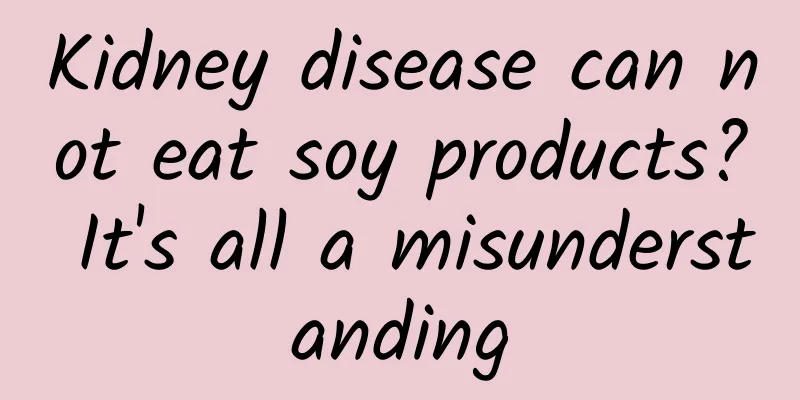Kidney disease can not eat soy products? It's all a misunderstanding

|
Diet management is an extremely important part of the treatment of chronic kidney disease. Many nephrologists place it on the same level as drug treatment. "Control your mouth and move your legs" is not only important for diabetic patients, but also for chronic kidney disease patients. However, there are still three common dietary misunderstandings among kidney disease patients. Myth 1: Can kidney patients only be vegetarians? Some kidney patients spontaneously become vegetarians after being diagnosed with kidney disease, refusing to eat meat, eggs or milk. As a result, the kidney disease is not well controlled, and instead symptoms of malnutrition such as anemia, fatigue, lack of energy, and poor sleep quality soon appear. In fact, animal protein is rich in inorganic salts, iron, vitamin B12, vitamin B1 and other nutrients essential to the human body. Even if you have poor kidney function, it is necessary to supplement 1 to 2 taels of lean meat daily. If you really don't like eating animal protein, you should supplement with an appropriate amount of soy products every day. Myth 2: People with kidney disease cannot eat soy products? As we all know, protein includes animal protein and plant protein. Although soybeans are plant protein, their protein content is very high. Every 100 grams of soybeans contains 36.3 grams of protein, which is more than the same weight of lean pork and beef (16.7 grams and 20.2 grams of protein respectively). Therefore, it is called high-quality protein together with animal protein. For kidney patients with proteinuria, it is recommended to eat high-quality protein, so they can eat soy products. However, it should be noted that there are many types of soy products, and soybeans, black beans, green beans and their soy products are high-quality proteins. Mung beans, red beans, peas, broad beans and kidney beans are starch beans, and their nutritional value is equivalent to that of ordinary grains. Kidney patients must pay attention when choosing. Myth 3: The more protein in urine, the more protein should be supplemented? Many kidney patients believe that if more protein is lost in urine, they should eat more and take more supplements. However, as protein intake increases, the amount of urine protein leakage also increases, the kidneys are in a high filtration state, the burden on the kidneys increases, and the kidney function declines faster. In other words, the more protein you eat, the faster it leaks, and the more serious the kidney damage. At present, a low-protein diet is recommended for patients with kidney disease, that is, protein intake is limited while ensuring sufficient calories (30-35kcal/kg·d). At the same time, as renal function gradually declines, protein intake requirements become more stringent. Starting from the 1st and 2nd stages of chronic kidney disease, it is advisable to reduce protein intake. Generally, 0.8 g/kg/day of protein is recommended; in the 3rd stage of chronic kidney disease, 0.6 g/kg/day of protein is recommended, and compound α-keto acid tablets are supplemented; in the 4th and 5th stages of chronic kidney disease, patients should restrict protein more strictly, and 0.4 g/kg/day of protein is recommended, and compound α-keto acid tablets are supplemented. In a protein diet, about 50% of the protein should be high biological value protein. |
<<: Why do you need to "shake" the wine glass before drinking it?
Recommend
Rowhammer vulnerability: After PCs are affected, Android devices are also vulnerable
[[175834]] Previously, the Rowhammer hardware vul...
Foxconn begins to come to the fore. What kind of game is Terry Gou playing?
Since Foxconn acquired Sharp, every decision made...
WeChat's latest version 8.0.16 is now available, and WeChat ads can finally be turned off
Just now, the official WeChat team pushed the lat...
The fastest animal in the world may be a relative of your bed! | Species Chat
In 2014, a mite named Paratarsotomus macropalpis ...
Advertising skills: Why do others get several times more clicks than you?
In this era where everyone is competing for atten...
Tencent QQ Android beta version 8.8.35 has been upgraded to 64-bit version
On October 15, according to netizens' feedbac...
Year-end review: This year, we pursued our dreams and settled in space
◎ Science and Technology Daily reporter Jin Feng ...
Li Meijin's Parenting Psychology Video Collection Series (51 episodes) Baidu Cloud Download
The complete collection of Li Meijin's parent...
Scientists have calculated that there are 200 trillion ants in the world. What does this mean?
People only know that there are a lot of ants, bu...
Can a short video startup monetize if it has a lot of fans? Are short video fans important?
Can a short video startup monetize if it has a lo...
ELISA《YouTube Operation and Promotion Practical Skills》How to play YOUTUBE in the eyes of foreigners
Training course content: How to use YouTube in th...
Guangzhou Hotel Mini Program Development and Production, How to Develop Hotel Reservation WeChat Mini Program?
With the continuous development of the Internet of...
[Exclusive Interview with Min Weijie] With 3.4 million new strokes occurring in my country each year, how dangerous is stroke?
Introduction: Stroke is a very common disease in ...
Android Network Security Configuration
[[198282]] The Network Security Configuration fea...









